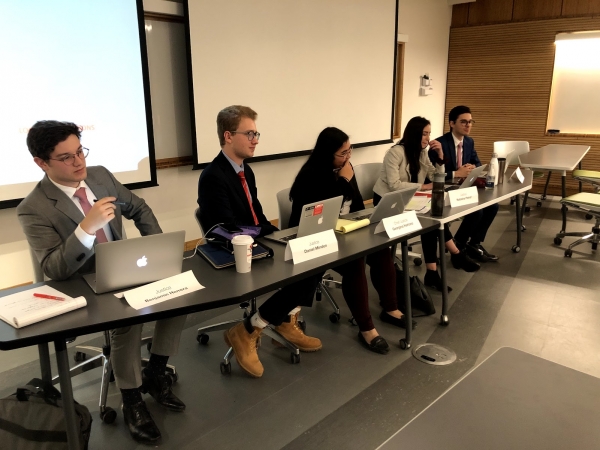The Student Society of McGill University’s (SSMU) Judicial Board (J-Board) held a hearing on Nov. 20 to determine if the Anti-Violence Fee Levy (AVFL) motion was constitutional. The AVFL passed referendum on Nov. 12 with 79.4 per cent of students in favour of the creation of the new fee, which would fund the implementation of the Gendered and Sexual Violence Policy (GSVP). Arts and Science Senator Bryan Buraga, the SSMU representative who referred the matter to the J-Board’s authority, firmly set the stakes for the hearing in his opening statement.
“[This petition] is a case of sexual violence,” Buraga said. “This will set a [precedent] for survivors.”
Buraga argued that the AVFL passed with an insufficient number of movers, or individuals supporting the motion. The Internal Regulations of Elections and Referenda (IR-ER) requires referendum questions to have at least four movers before being approved by the SSMU Legislative Council; the AVFL only had three when it passed. Buraga also claimed that the SSMU executives showed poor judgement when they did not immediately allocate funding for the GSVP. He asserted that SSMU has the capital to pay for it given that, following last month’s Children of the Corn Halloween event, SSMU expects to reimburse students $10,000 in Uber fares after they were unable to provide transportation back from Macdonald Campus.
“SSMU has found funding for other ad-hoc expenses,” Buraga said “The VP Internal said that SSMU priotisizes safety over cost, but the executive has demonstrated the opposite.”
Although he was listed as a respondent on Buraga’s petition, SSMU Vice-President (VP) Finance Jun Wang was absent from the hearing. Wang, who is responsible for financing the GSVP, stated that he didn’t believe that his presence at the hearing was warranted.
“[My absence] is a statement to be made to the filer of the petition to say how much I don’t believe that this is a matter of constitutionality, but rather [Buraga] is just trying to strike down this fee,” Wang said. “I believe that most people will understand that, with the building closure, the budget is not there and that we’re running at a deficit. If I were to attend the hearing, I would just be repeating that.”
SSMU President Tre Mansdoerfer argued that Buraga has overlooked a contradiction in SSMU policy. The Internal Regulations of Governance (IR-G) state that the Standing Rules determine the number of movers a motion needs to pass: Currently, at least three movers are required. In cases where internal regulations contradict each other, the rules within the IR-G take precedence over the IR-ER.
“Main motions require a minimum of three (3) movers to be presented before Council,” the Standing Rules read.
Buraga replied that there is no contradiction between the IR-ER requiring four movers and the IR-G requiring three. He reasoned that the IR-G only claims that it is necessary to have at least three movers, not that having at least three movers is sufficient, leaving room for additional requirements.
In response to Buraga’s accusation of poor judgement, Loïc Welch, a law student at McGill who represented Mansdoerfer at the hearing, argued that the executive has acted in a manner that assures SSMU student security.
“The President and the executive clearly acted within their standards of care,” Welch said. “They quickly moved the AVFL through SSMU in order to fund the GSVP.”
Buraga, who detailed his own experience with sexual violence in a Letter to the Editor of The McGill Tribune, closed his statement with an impassioned plea to the justices.
“There is an immediate crisis of funding […] and, as a result, I have not been able to get the protection I need,” Buraga said. “No student should have to stand here and go through this.”
Chief Justice Georgina Hartono announced that the J-Board will have two weeks to deliberate. A written judgement will be submitted to the Board of Directors on Dec. 4, and the Board will either affirm, issue an order for amendment, or deny the judgement.









